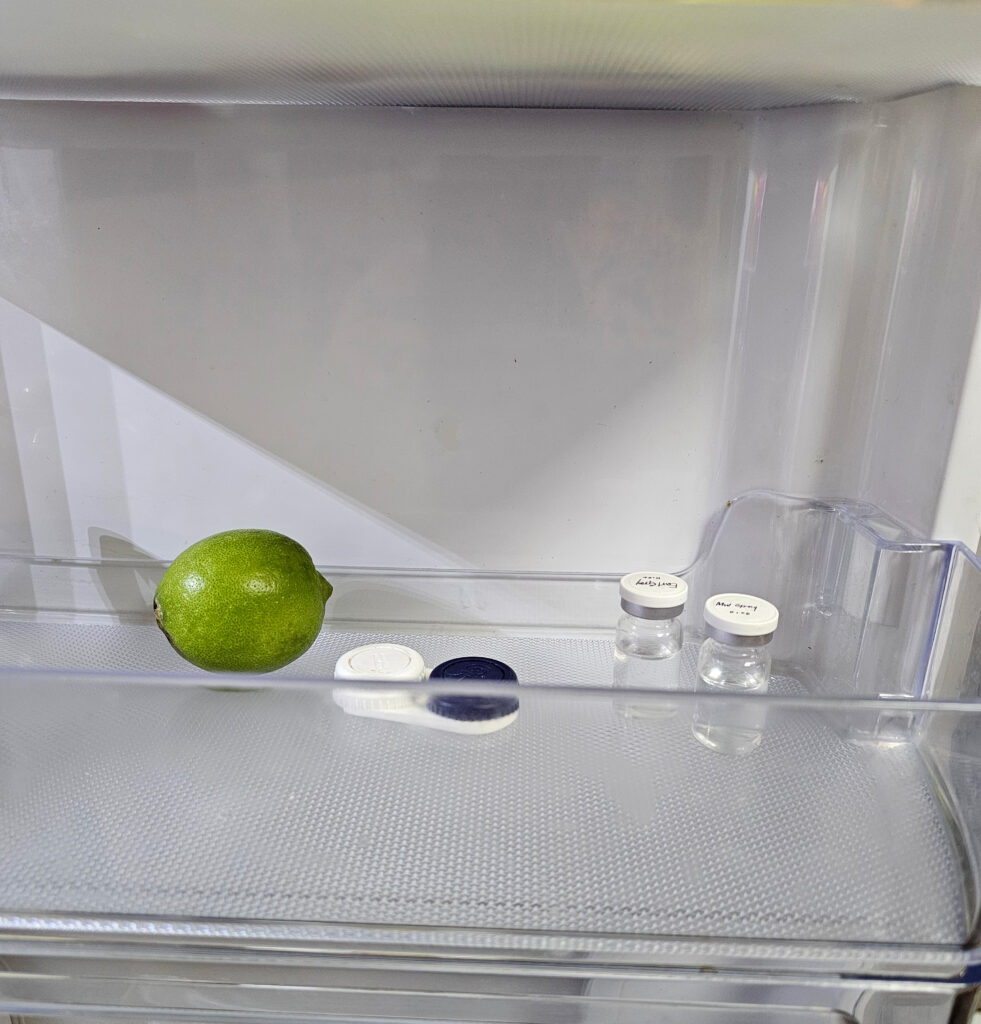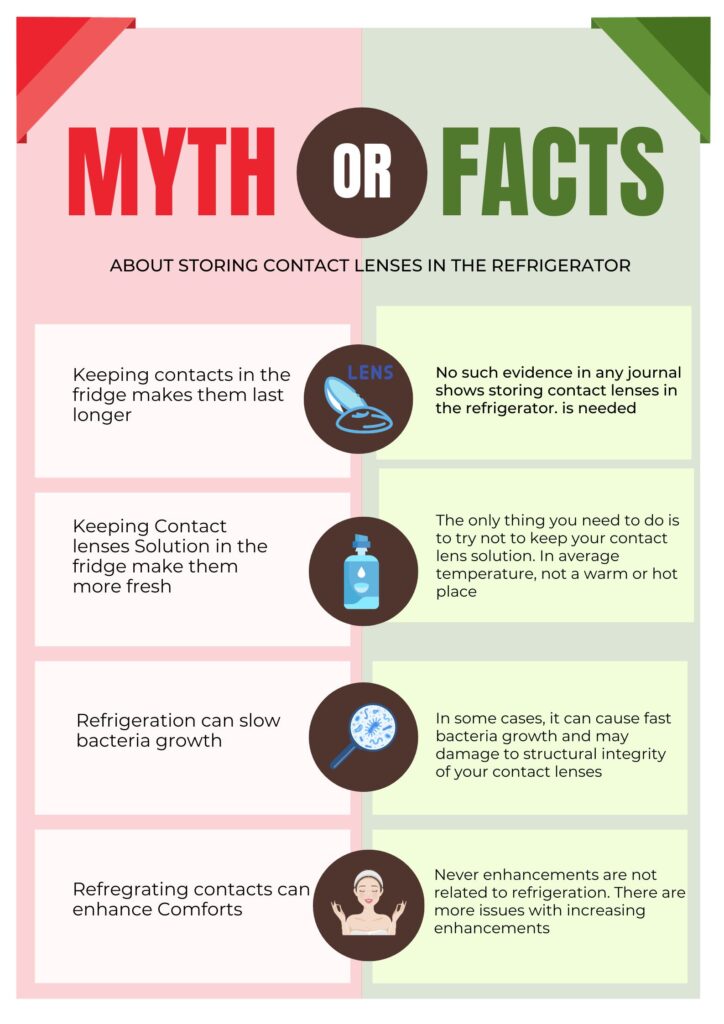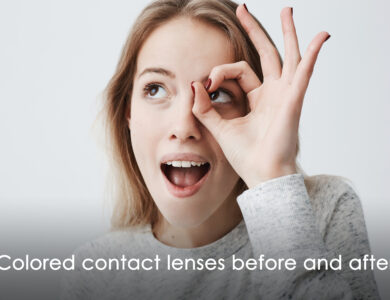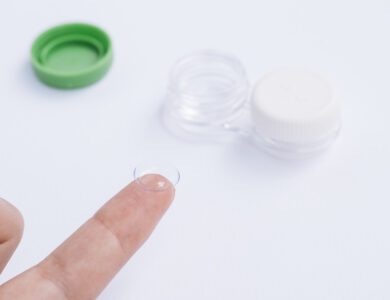
Not at all; we do not recommend storing any contact lenses in the fridge because it may lead to potential risks like eye infection.
Keep your contact lenses in optimal conditions, like room temperature, not in the fridge. To find out more, follow our actual experiment in the article.
Why People Consider Refrigerating Contact Lenses
It’s not uncommon for individuals to think that refrigeration can extend the life of their contact lenses or enhance comfort. However, let’s debunk the myths and understand why this belief exists in the first place.
Most people believe that refrigeration can make some things like contact lenses or contact lenses’ solution life last longer.
On the other, you may know that refrigeration can slow bacterial growth. But it does not mean you should put your contact lenses in the refrigerator.

Impact of Storing in the Refrigerator on Contact Lenses
Contrary to popular belief, storing contact lenses in the refrigerator can have adverse effects. We’ll explore how the chilly environment can impact the structural integrity of any contact lens and potentially compromise its performance.
Proper Storage Conditions for any contact lenses
Storing your contact lenses in the right conditions is crucial to maintain their quality. You can learn about the best storage environment and why it differs from the cold confines of your refrigerator.
Room Temperature vs. Refrigeration of Storing Contact Lenses
Let’s compare the pros and cons of keeping contact lenses at room temperature versus in the refrigerator.
Room Temperature:
Pros:
- Convenience: Storing contact lenses at room temperature is convenient and requires no additional steps. It’s the standard recommendation by most manufacturers.
- Comfort: Room temperature lenses may feel more comfortable on the eyes, as refrigerated lenses can be colder initially.
Cons:
- Bacterial Growth: Room temperature provides a suitable environment for bacteria to grow on lenses over time. Exposure to certain factors can increase the risk of getting eye infections.
- Shorter Shelf Life: Contact lenses may have a shorter shelf life (When stored at room temperature, the product has a shorter shelf life), especially in environments with high humidity or fluctuating temperatures.
Refrigerator:
Pros:
- Extended Shelf Life: Storing contact lenses in the refrigerator can extend their shelf life, preventing premature deterioration of the lens material.
- Reduced Bacterial Growth: Cold temperatures slow bacterial growth, reducing the risk of contamination on the lenses.
Cons:
- Initial Discomfort: Refrigerated lenses can feel cold when inserted, causing temporary discomfort until they reach body temperature.
- Condensation: When taken from the refrigerator to a warmer environment, lenses may experience condensation, affecting clarity and comfort.
Potential Risks and Irritations of storing contact lenses in the refrigerator
Improper storage can lead to various issues, from discomfort to serious eye irritations. We’ll delve into the potential risks of storing contact lenses in the refrigerator and why following recommended guidelines is essential.
Expert Opinions about where and how to store your contacts
What do eye care professionals and reputable organizations say about contact lens storage? We’ll be looking for expert opinions to give you a well-rounded view.
Alternative Storage Methods of Storing Contact Lenses
What are the alternatives if the refrigerator isn’t the ideal place for your contact lenses? I’d like you to please discover safe and effective storage methods that prioritize your eye health.
Moisture and Eye Health
Moisture plays a crucial role in maintaining comfortable vision with contact lenses. We’ll explore how the refrigerator’s dry environment can impact the moisture content of your lenses and what it means for your eyes.

My experience of keeping my own contacts in the fridge?
In my idea, places with optimal temperature, of course not cold ones like a fridge, can help to make your contacts safer and help you live longer although my own idea did not convince me, so I decided to give it a try :
I put both brand-new and used contact lenses in the fridge to check them out :
When I tried on my brand new and used contact lenses, I felt the surface of my contacts; it was extraordinary, nothing more. I did not see any effects or irritations on the first day, and taking some time was a matter of fact. After that day, my eyes started to vomit, and I had eye redness.
Please never do this experiment, which I did at all, and also, do not try any contact lenses in the fridge or freezing place.
I figured out the problem started when we put our contact lenses in the fridge and brought them out from there. This process continues rapidly, and it may damage
General Tips for Storing Your Contacts:
- Follow Manufacturer Recommendations: Please always follow the specific recommendations provided by the manufacturer to store your type of contact lenses.
- Proper Hygiene: Maintaining good hygiene practices is crucial regardless of storage method. Wash hands thoroughly before handling lenses, and use recommended cleaning and storage solutions.
Final Conclusion
In conclusion, the refrigerator may seem like a convenient storage spot, but better choices exist for storing your contact lenses. Understanding the science behind proper storage conditions will ensure the longevity of your lenses and promote optimal eye health.

FAQs About Contact Lens Storage
- Can storing contact lenses in the refrigerator damage them?
- Yes, the cold temperature can compromise the structural integrity of contact lenses.
- Are there any benefits to refrigerating contact lenses?
- Refrigeration is not recommended as it can lead to discomfort and potential eye irritations.
- What is the ideal room temperature for storing contact lenses?
- Room temperature, around 68-77°F (20-25°C), is optimal for maintaining the quality of contact lenses.
- Can I use distilled water to store my contact lenses?
- While distilled water is recommended, temperatures below freezing should be avoided to prevent lens damage.
- How do alternative storage methods compare to refrigeration?
- Alternative methods, such as using proper lens storage cases, are safer and more effective for maintaining contact lens integrity.
- What do eye care professionals say about contact lens storage?
- Experts advise against storing contact lenses in the refrigerator and emphasize following recommended storage guidelines.
- How does moisture impact the comfort of contact lenses?
- Moisture is crucial for comfortable contact lens wear, and storing them in the refrigerator’s dry environment can lead to discomfort and irritation.



